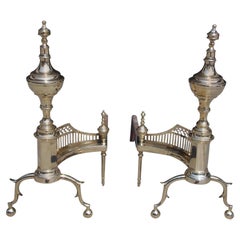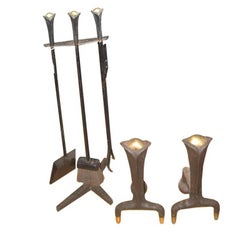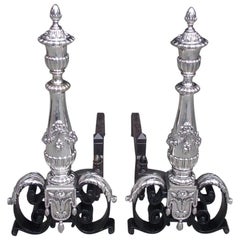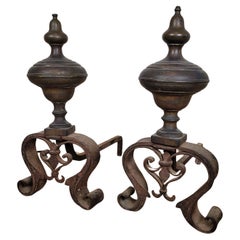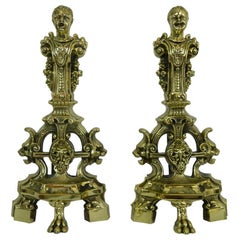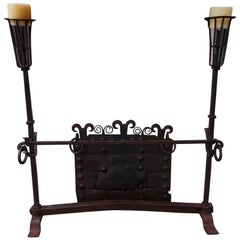Andirons
1810s American American Colonial Antique Andirons
1950s American Mid-Century Modern Vintage Andirons
Brass, Iron
1830s Italian Neoclassical Antique Andirons
Silver, Bronze, Wrought Iron
19th Century French Louis XIV Antique Andirons
Bronze, Wrought Iron
19th Century French Antique Andirons
Brass, Iron
1750s English George II Antique Andirons
Wrought Iron
18th Century and Earlier American Antique Andirons
Early 20th Century American Aesthetic Movement Andirons
Wrought Iron
1850s American American Empire Antique Andirons
Brass, Steel
19th Century French Antique Andirons
Steel
1810s Italian Neoclassical Antique Andirons
18th Century and Earlier American American Classical Antique Andirons
19th Century Italian Antique Andirons
Late 19th Century American Antique Andirons
Wrought Iron
18th Century French Antique Andirons
Bronze
1750s Dutch Other Antique Andirons
Brass, Iron
1780s American American Colonial Antique Andirons
Brass, Wrought Iron
Early 19th Century Scottish Georgian Antique Andirons
Iron
Early 1900s Unknown Empire Antique Andirons
Brass, Iron
1970s Modern Vintage Andirons
Brass, Iron
1810s American American Colonial Antique Andirons
Brass, Wrought Iron, Wire
19th Century American Antique Andirons
1820s American American Empire Antique Andirons
Iron, Wrought Iron
Early 1800s American American Colonial Antique Andirons
1950s American Vintage Andirons
Metal
19th Century French Louis XIII Antique Andirons
Iron
18th Century and Earlier British George I Antique Andirons
1820s English Gothic Revival Antique Andirons
Bronze, Steel
19th Century French Louis XIV Antique Andirons
Ormolu
19th Century English Renaissance Revival Antique Andirons
Brass, Iron
1890s French Louis XV Antique Andirons
Iron
Early 1900s English Arts and Crafts Antique Andirons
Iron
1980s Italian Post-Modern Vintage Andirons
Metal
20th Century Andirons
Iron
Early 20th Century American Arts and Crafts Andirons
Wrought Iron
Late 19th Century French Empire Revival Antique Andirons
Brass
Early 20th Century British Arts and Crafts Andirons
Brass, Iron
1920s American Arts and Crafts Vintage Andirons
Bronze, Wrought Iron
19th Century French Louis XIII Antique Andirons
Iron
20th Century American Mid-Century Modern Andirons
19th Century French Louis XIII Antique Andirons
Iron
1920s American Vintage Andirons
Brass, Iron
Late 20th Century Post-Modern Andirons
19th Century French Renaissance Antique Andirons
Bronze
1950s French Mid-Century Modern Vintage Andirons
Steel, Chrome
19th Century French Napoleon III Antique Andirons
Brass
Late 19th Century French Belle Époque Antique Andirons
Bronze
19th Century Adam Style Antique Andirons
Brass, Iron
1920s French Art Deco Vintage Andirons
Wrought Iron
2010s English Georgian Andirons
Iron
Mid-20th Century American Mid-Century Modern Andirons
Iron
2010s American Post-Modern Andirons
Metal, Brass
Late 18th Century European Other Antique Andirons
Bronze, Iron
1860s French Rococo Antique Andirons
Bronze
1980s Belgian Vintage Andirons
Bronze
19th Century French Napoleon III Antique Andirons
Iron
18th Century British Antique Andirons
Wrought Iron
19th Century French Gothic Antique Andirons
Bronze, Iron
Early 20th Century American Andirons
Bronze
1970s Belgian Vintage Andirons
Bronze
Antique and Vintage Andirons
A set of antique or vintage andirons is a staple accessory, part of the fireplace tools you’ll want to collect for keeping a neat and elegant fireplace in your home.
Using andirons in a fireplace elevates the fire, ensuring more air can get to the logs thus keeping a fire burning longer. Andirons also encourage ventilation and may also prevent smoke from working its way into your living room or bedroom.
Think of these accessories as part of an upright metal support system to optimize your fire. Antique andirons are basically u-shaped brackets with a curved end that come in pairs and are largely quite simple in structure, but the design of this household necessity has improved over time. Outwardly decorative andirons have become available since their debut because one should never underestimate the style quotient of an attractive hearth.
Andirons, which earned the nickname “firedogs” given their similarity in form to a pair of upright canines, are believed to be the oldest fireplace furnishings. They have been used broadly since at least the late Iron Age. Before iron became the material of choice, stone andirons did a suitable job of balancing the logs in a fire and adding a sense of symmetry to the hearth. Fire baskets, like the combination of andirons and a grate, afforded an opportunity to layer logs in a fire rather than delicately stacking them on andirons.
Today, andirons can be found in bronze and brass, too, which contrast wonderfully with a mantel carved from dark marble, for example, and add dimension to what might otherwise be a subdued space. And while people aren’t cooking in the fireplace anymore, andirons’ spit hooks offered an opportunity to roast meat or rest the pokers that you typically would’ve kept fireside.
During the Renaissance, andirons became especially ornate and even figurative, taking on human forms as well as marine life such as dolphins. Art Deco–era andirons are particularly exquisite. While the accessories are frequently characterized by rich geometric angles and sculptural curves, attributes that we know of most Art Deco furniture, artisans of the period also looked to what was by then a long tradition of designing andirons in the shape of animals and reptiles.
Adding fashionable antique or vintage andirons will not only improve the quality of a fire but can also elevate your space as well as the fireside experience. Find modern andirons, Art Nouveau andirons and other varieties today on 1stDibs.
